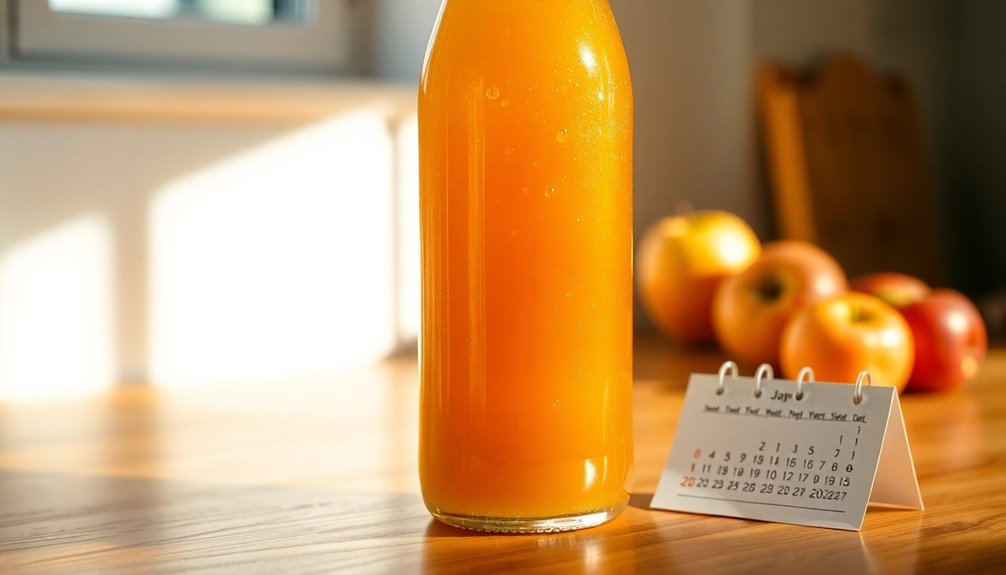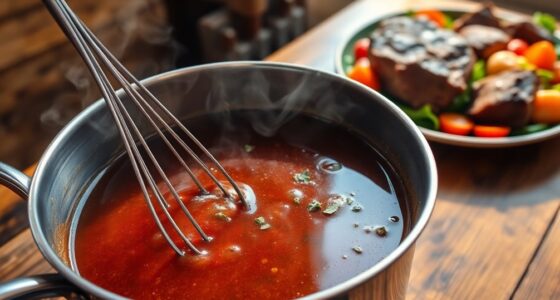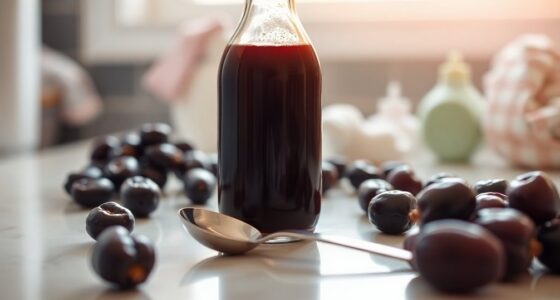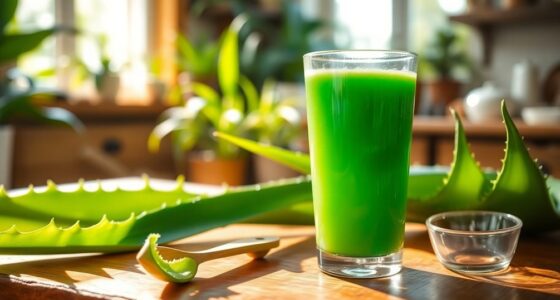Apple juice can last in the fridge for different lengths depending on its type. Opened store-bought apple juice typically stays fresh for up to 10 days. Canned juice generally lasts about a week after opening, while cold-pressed varieties need to be consumed within 2 to 3 days. Homemade juice is best enjoyed within 48 hours. Always watch for spoilage signs, like off smells or color changes—there's more to know about preserving your juice!
Key Takeaways
- Opened store-bought apple juice lasts up to 10 days in the fridge if sealed properly.
- Canned apple juice is good for about a week after opening when refrigerated.
- Cold-pressed apple juice should be consumed within 2 to 3 days after opening for optimal freshness.
- Homemade apple juice is best enjoyed within 48 hours due to the absence of preservatives.
- Always check for spoilage signs like off smells, changes in color, or unusual texture before consuming apple juice.

When you open a bottle of apple juice, you might wonder how long it'll last in your fridge. Understanding the lifespan of your apple juice can save you from potential waste and ensure you enjoy it at its best. Generally, opened store-bought apple juice can last up to 10 days in the fridge if it's properly sealed and stored. This means keeping the cap tightly closed and placing it in the coldest part of your fridge. By doing this, you'll maximize its freshness and flavor.
If you're dealing with canned apple juice, it's similar. Once you crack it open, you can expect it to stay good for about a week when refrigerated. Just like with the bottle varieties, make sure to seal it properly after each use.
If you've got cold-pressed apple juice, though, you'll need to act a little quicker. Ideally, you should consume it within 2 to 3 days after opening to enjoy it at its optimal freshness. This type of juice is less processed, which often means it has a shorter shelf life due to the lack of preservatives. However, commercially purchased cold-pressed juice can be more forgiving. If you haven't opened it yet, it can last up to three weeks in the fridge.
Now, if you've taken the time to make homemade apple juice, you'll want to drink it even sooner. For homemade varieties, especially cold-pressed, it's best to consume it within 48 hours. The freshness of homemade juice is unmatched, but it requires a bit more urgency in consumption. Always remember that homemade juices lack the preservatives found in store-bought options, which is why their window for optimal freshness is smaller.
Regardless of the type of apple juice you're enjoying, always be vigilant for signs of spoilage. Off smells, changes in color, or any unusual texture can indicate that your juice has gone bad. If you notice any of these signs, it's best to err on the side of caution and discard the juice. Your health is more important than trying to salvage an old drink.
Frequently Asked Questions
Does Apple Juice Go Bad in the Fridge?
Yes, apple juice can go bad in the fridge.
If you notice mold, cloudiness, or a sour smell, it's best to toss it out. These signs indicate spoilage, and consuming it could make you sick.
To keep your juice fresh, store it in an airtight container and consistently refrigerate it.
How Long Is Martinelli's Apple Juice Good for Once Opened?
Did you know that once opened, Martinelli's apple juice is best enjoyed within 7 to 10 days?
Keeping it tightly sealed in its original container or an airtight bottle helps maintain its quality.
If you notice cloudiness, off-smells, or mold, it's time to toss it.
To keep your juice fresh, store it in the fridge and avoid letting it sit out at room temperature for too long.
Enjoy your refreshing drink!
How Long Can Opened Juice Last in the Fridge?
Once you’ve opened juice, it typically lasts about 5 to 10 days in the fridge, depending on the type. To ensure the best flavor and quality, it’s advisable to consume juice within the first few days after opening. Additionally, always check for any signs of spoilage, such as changes in color or an off smell, before drinking. Understanding how long bottled juice lasts can help you plan your consumption and minimize waste, ensuring you enjoy it at its best.
Store-bought varieties often have preservatives, allowing them to last longer, while fresh or cold-pressed juices may spoil within a few days.
Always check for signs of spoilage like off smells or unusual colors before drinking.
To enjoy the best flavor and quality, try to consume it within the recommended timeframe after opening.
Is It Okay to Drink Old Apple Juice?
If you've ever taken a swig of a questionable potion in a fantasy tale, you know the importance of checking what you consume.
It's not okay to drink old apple juice if it's past its prime. Look for signs of spoilage like a sour smell or fizzy texture.
If you notice any of these, toss it out. It's better to be safe than sorry when it comes to your health!
Conclusion
In conclusion, apple juice can last about 7 to 10 days in the fridge once opened, but it's best to use your senses to ensure it's still fresh. If it smells off or has an unusual color, toss it out. Remember, a week with apple juice can feel like an eternity when you're craving that crisp, refreshing taste! So, enjoy it while it's still at its peak and savor every last drop of fruity goodness.
Cindy thoroughly researches juicing trends, techniques, and recipes to provide readers with practical advice and inspiration. Her writing style is accessible, engaging, and designed to make complex concepts easy to understand. Cindy’s dedication to promoting the advantages of juicing shines through her work, empowering readers to make positive changes in their lives through the simple act of juicing.











